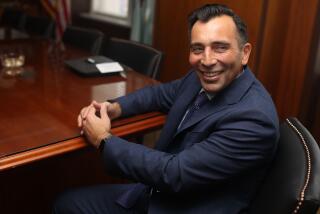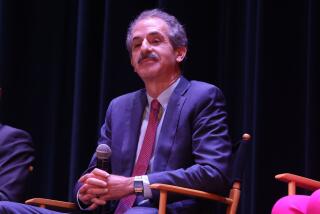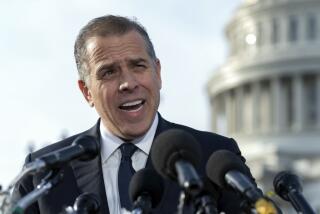Alaska corruption case clouded by prosecution’s missteps
The scene captured by a hidden FBI camera in Suite 604 of the Baranof Hotel in Juneau has become one of the most famous in a state well-versed since the gold rush days in what happens when money, ambition and alcohol intersect.
Victor Kohring, then a state legislator, showed up for a meeting with Bill Allen and Rick Smith, then the president and vice president, respectively, of Veco Corp., a large oil services company. Kohring tells the executives a hard-luck story involving a $17,000 credit card bill.
“Let me see what I can do with it,” Allen says, handing over a small amount of cash, purportedly for Kohring to put in his daughter’s Easter egg.
“What can I do at this point to help you guys? Anything?” Kohring asks. At the time, Allen and Smith were working hard to win passage of an oil tax bill pending in the state House of Representatives. Allen ticks off the legislators who need to be brought on board.
“You bet,” Kohring says. “OK.”
The video was hard to argue with, yet Kohring, who took $1,000 from Allen on another occasion, proved to be a tough “get” for prosecutors. Only on Friday, more than five years after the meeting at the Baranof, did Kohring and Alaska’s former House Speaker Pete Kott plead guilty to a single felony count each — a modest conclusion to one of the U.S. Justice Department’s most ambitious anti-corruption operations of the last decade.
The aim had been to bring down the alliance between Republican lawmakers and the oil industry, dubbed the “Corrupt Bastards Club,” which had dominated Alaskan politics for years. To a degree, it succeeded. Six lawmakers and a former governor’s chief of staff went to jail or paid fines; the nation’s longest-serving Republican U.S. senator, Ted Stevens, was toppled. And in a memorable side effect, Sarah Palin was launched on her trajectory to the governor’s office riding on an anti-corruption platform.
“That’s 10% of the Alaska Legislature,” Karen Loeffler, U.S. attorney in Anchorage, said after tallying the convictions Friday. “I think we have a better government today, where deals are not made in the backroom of a hotel, hidden from citizens.”
But the probe dubbed “Operation Polar Pen” may have damaged as many careers in the Justice Department as it did in Juneau. Two investigations are still looking into charges of misconduct on the part of prosecutors. One of the lead federal attorneys in the case committed suicide. And some of the state’s most powerful politicians — including Stevens’ son Ben, who received $243,250 in consulting fees from Veco — were never charged. Indeed, many here say the network of oil, money and power that has long run Alaska still does.
In pronouncing the sentences Friday, U.S. District Judge Ralph Beistline called the 2006 legislative sessions “a truly dark moment in the state’s history.”
“I remember the words of President Gerald Ford after Watergate,” the judge said. “I recognize the need to put this long state nightmare to an end.”
The 72-year-old Baranof Hotel, squatting above the jewelry stores and souvenir shops that huddle in the rain below Juneau’s stunning snowy peaks, passes for elegant in a frontier kind of way. Suite 604 is a retro retreat of pile carpeting, motel-style coffee tables and cheap upholstered couches. Veco executives used it as their private salon during the brief, intense sessions of the Alaska Legislature. There was always plenty of liquor.
Allen’s main aim in 2006 was to get a tax bill approved that would provide oil companies with the comfort level they needed to build a multibillion-dollar gas pipeline from the North Slope. He and Smith spent much of the session holding chats at the Baranof, with the FBI watching.
Prosecutors began racking up cases, including the early conviction of Kott, and turned Allen their star witness. But they foundered when they reached the big fish — Sen. Stevens, who was accused of taking heavily discounted remodeling jobs on his home and other gifts from Veco and not reporting them.
He was convicted by a jury, but the case blew apart. Stevens’ lawyers, and then other defense attorneys, discovered that prosecutors had failed to show the defense material that suggested Allen and others had sometimes given contradictory, and less incriminating, accounts of what happened. Not only that, but defense lawyers learned late in the game that Allen had been investigated on accusations of statutory rape involving teenage girls. It could be argued, an appeals court agreed, that the threat of prosecution for that could have induced Allen to testify to almost anything.
“Allen is a horrible witness,” Nicholas Marsh, a young Justice Department lawyer brought in from Washington, D.C., to run some of the cases, complained in a 2007 email that defense lawyers for Kott saw only after his conviction. “He’s been backsliding significantly on us.... He has now taken to volunteering, even when not asked, things like ‘Pete Kott was my friend’ and ‘He never extorted me.’”
The coup de grâce was a whistle-blower complaint from FBI agent Chad Joy that said prosecution errors and omissions amounted to “serious violations” of federal rules and “possible criminal violations.” Among other allegations, Joy said the lead FBI agent in the case had an improperly close relationship with Allen and other sources.
Judge Emmet G. Sullivan was furious, and the Justice Department moved on its own to dismiss the indictment against Stevens in April 2009 (the former senator was killed in a plane crash a little more than a year later). Kott and Kohring, whose lawyers went on to gain access to thousands of pages of new prosecution documents, had their convictions reversed on appeal and were offered new trials.
Then another prosecution fell apart. Then-Juneau lawmaker Bruce Weyhrauch was hauled before the court after he offered to work as a lawyer for Veco during the oil tax vote. But he never took any money, and a Supreme Court ruling heavily undermined prosecutors’ alternative theory of wrongdoing — upholding a defense argument that Marsh and other prosecutors had impatiently dismissed.
Weyhrauch attorney Doug Pope said Marsh “believed he was the smartest guy in the building.” But the truth, he believed, was that Marsh and other young prosecutors weren’t being closely supervised from Washington. “I was saying before the trial, ‘This is a bunch of kids playing in a sandbox. There’s no adult supervision.’”
More than two years after they were launched, the investigations into prosecutorial misconduct remain ongoing and secret.
William Welch II, who headed the Justice Department’s public integrity section, was transferred to Massachusetts. His deputy, Brenda Morris, who took the lead prosecution chair in the Stevens trial, transferred to Atlanta. Marsh, who spent much of four years detailed to Anchorage overseeing several of the cases, was relegated to the department’s Office of International Affairs.
Marsh, his friends said, grew increasingly frustrated in what he saw as exile, fearing as the investigation dragged on that it would be found convenient to pile the blame on him for the prosecution’s missteps, even though his actions had all been approved by his superiors, including Welch.
“He was extraordinarily ethical, someone of great character, which is why these allegations were particularly hard on him,” said Josh Waxman, a Washington, D.C., attorney and Marsh’s longtime friend.
Marsh believed his transfer out of active prosecutions “was a preview of how the investigation was going to turn out,” Waxman said. “I believe it was a fateful one in his mind. It had deep, deep psychological impacts.”
On Sept. 26, 2010, two days before Stevens was buried with military honors at Arlington National Cemetery, Marsh, 37, hanged himself in the basement of his Washington, D.C., home.
The Justice Department and the independent prosecutor have refused to say why the misconduct investigations still have not concluded. “Off the record,” said one attorney involved in the case. “Are they waiting for another prosecutor to commit suicide?”
Many worry that blow-back over the prosecution’s missteps will eclipse the fact that politicians were caught on tape taking bribes.
“The saddest part of all of this is somehow people think that Ted Stevens wasn’t guilty,” said Melanie Sloan, director of Citizens for Responsibility and Ethics in Washington. “And he was. He did all those things. He was convicted, and he was convicted on real evidence,” she said. “It’s just that the Justice Department screwed up so much that the case was dismissed.”
More to Read
Start your day right
Sign up for Essential California for news, features and recommendations from the L.A. Times and beyond in your inbox six days a week.
You may occasionally receive promotional content from the Los Angeles Times.






